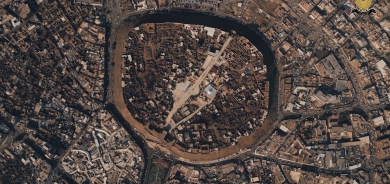Sulaimani’s Newest Hotel Beckons Like a Beacon

SULAIMANI, Kurdistan Region - The dream of Iraqi Kurdistan’s so-called “Red Millionaire” has come true: The biggest and newest five-star hotel in Iraq opened in Sulaimani with the Kurdish prime minister cutting the ribbon, a serenade of fireworks and many hundreds of guests.
The Grand Millennium Hotel Shary Jwan is the new landmark of the autonomous Kurdistan Region’s second city. The hotel, built by the local Faruk Group Holding which belongs to one of the city’s richest businessmen, Faruk Mustafa, catches the eye in and outside the city. The blue-glass skyscraper towers over Sulaimani from a hill.
“It is another success story of the Kurdish economic boom,” said Prime Minister Nechirvan Barzani during an opening speech in the hotel’s ballroom, with hundreds of invited guests seated at round tables for dinner. “The private sector is really important for the region. We realized early on that we cannot do without.”
He praised “the rich in Kurdistan that are helping the government with their wealth and money to build the country,” and called on them to do even more. Recently, Kurdish businessmen have helped the regional government with millions of dollars in loans to pay the salaries of civil servants, after Baghdad froze Kurdistan’s constitutional share from the Iraqi budget over a seething oil row.
Mustafa, the businessman behind the new hotel, earned his nickname of the “Red Millionaire” because he was once an active communist inside the Kurdish resistance of the 1970s and 80s. He turned into one of Kurdistan’s richest businessmen and its first billionaire, starting his business empire by setting up one of the main Kurdish telephone companies, Asiacell, which now operates across Iraq.
He wants to serve the community with the hotel, said Hawre Daro Noori, CEO of the Faruk Group Holding. “We’ve done something special, for all of Iraq.”
So special, that Mustafa does not expect to see much back anytime soon from his investment of 250 million dollars, according to Daro. “He wanted to fulfil his dream.”
The hotel has 253 rooms, of which 150 are operational and seven restaurants, of which three are open. It also has a large ballroom, an auditorium that seats over 250 people and 12 meeting rooms in different sizes. Many of the visitors at the opening gala voiced doubt whether the hotel would fill up anytime soon.
Nor does it have to, said Daro. “A hotel like the Rotana Hotel in Erbil is set up to make profit. The Shary Jwan is not. It is meant to attract companies and businesses and to do something back for the society.”
The Kurdistan capital of Erbil already has a number of five-star hotels and some more being built. The Shary Jwan is the first luxury hotel of its kind in Sulaimani.
The idea of building it emerged when the company could not find a suitable place for board meetings of Asiacell, said Daro. “Now, we have it here, so we don’t have to travel abroad anymore.”
The new hotel’s general manager, Amro Shenawy, puts the question of what comes first, the facility or the demand. “Perhaps the demand is not there, but it will come. I expect we need at least two years to attract enough businessmen and foreigners.”
For that reason, the hotel’s prices will be moderate, compared to the other luxury hotels, he announced. The manager expects guests in all categories to come: business, leisure, tourists and the locals who can afford weekends in the spa and swimming pool.
And once Iraq’s first revolving restaurant at the top opens, many locals will make it their place to be, he predicted. That was an opinion shared by visitors at the opening night: Sulaimani people like these kinds of novelties, many said.
But more importantly, Shenawy said, the hotel has changed the way people look at Sulamani. “It is the new landmark.”
For Mustafa, an important part of the project is to offer jobs in the local market, said Daro. “We did that before with Asiacell and the cement factory that is part of our holding. We started with a lot of foreigners. But, for instance Asiacell, now has about 98 percent local staff.”
Partly for that reason, the Kurdistan government has been stimulating initiatives that may boost the still young tourism sector. Erbil, the Arab Tourism Capital of 2014, is expected to bring in thousands of new visitors, both for business and leisure. Some of them may discover Sulamani, too.
Premier Barzani, who had been staying at the hotel’s presidential suite prior to the opening, stressed that projects to attract tourists are highly supported by his government. “KRG is lost without tourism, it is an important source of income,” he said.
Rudaw














